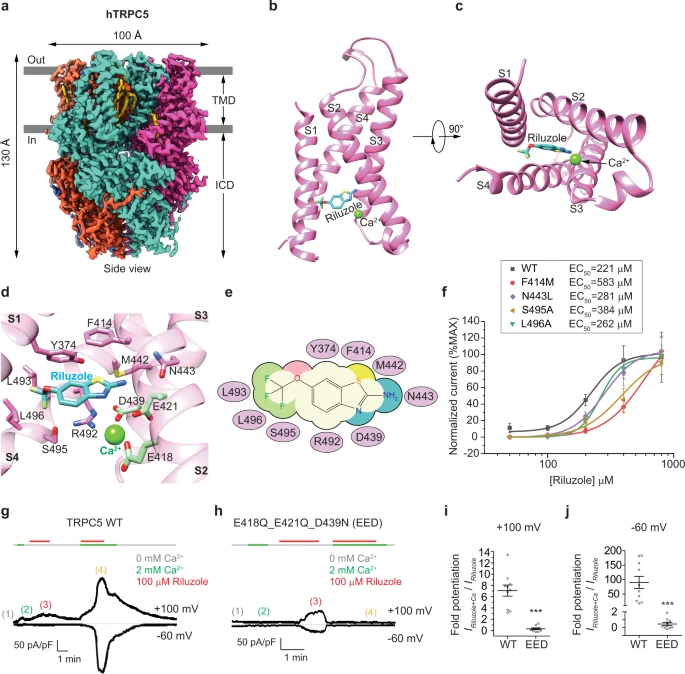Yaxiong Yang, associate professor at the School of Biological Science and Medical Engineering, Beihang University. He obtained his bachelor's degree from Xiamen University in 2012 and Ph.D. in Biomedical Engineering from Tsinghua University in 2018. In the same year, he joined Beihang University's School of Biological Science and Medical Engineering through the Postdoctoral Innovation Talent Support Program. In 2020, he became an associate professor at the university and was selected for the Medical Engineering Hundred Talents Program and the Youth Top Talent Program. His research focuses on molecular neuroscience and molecular biomechanics, with first or corresponding author publications in journals such as Nature Communications, Cell Discovery, eLife, Advanced Science, and Structure. His academic achievements have been recommended by international academic groups like Faculty Opinions. He has led multiple research projects supported by funds such as the National Natural Science Foundation, Science and Technology Commission, Beijing Natural Science Foundation, Youth Top Talent Program, Postdoctoral Innovation Talent Support Program, and Postdoctoral Fund.
Calcium channels and calcium signaling are classic research subjects in neuroscience with decades of history. Calcium ions are involved in numerous biological processes such as development, proliferation, apoptosis, transcription, excitability, learning, and memory. They enter neurons through cell membrane ion channels or receptors, activating related signaling proteins and regulating various physiological functions. In the nervous system, calcium channels and signaling are closely related to neurotransmitter secretion, neurite development, neural network formation, and higher brain activities. Although we have established clear links between calcium channels/signaling and many pathological processes like neuronal transcription, development, learning and memory, neurodegeneration, and neurological disorders, there are still many new phenomena and questions in this field awaiting exploration. We aim to investigate the operation modes of calcium signals and channels and their impact on neuronal functions from new perspectives, providing new insights into the nervous system's mechanisms. Based on breakthroughs in basic research, we also strive to develop new methods to modulate calcium channels, signaling, and neuronal functions non-invasively using light, magnetism, etc., offering new approaches for neural manipulation and brain disease treatment.
Living organisms perceive mechanical force stimulation and regulate corresponding physiological processes. Cells contain various mechanosensitive proteins (e.g., mechanosensitive channels) that regulate cell excitability, transcription, and fate through mechanotransduction. We aim to use techniques like electrophysiology, bio optical imaging, cell micro-nano manipulation, molecular and cell biology, biochemistry, and biophysical modeling to understand the specific mechanisms of mechanotransduction at molecular and cellular levels. Additionally, we seek to develop monitoring and modulation methods for mechanotransduction at the cell and molecular levels using synthetic biology and biomaterials, achieving mechanical control of cell fate.
ORCID iD: https://orcid.org/0000-0002-3313-6049
Yuankun Sun, Jinli Geng, Yu Fan, Yangmei Li, Yuan Zhong, Jing Cai, Xiaodong Liu*, Shaomeng Wang, Yubin Gong*, Chao Chang*, Yaxiong Yang*, Chunhai Fan, A Non‐Invasive and DNA‐free Approach to Upregulate Mammalian Voltage‐Gated Calcium Channels and Neuronal Calcium Signaling via Terahertz Stimulation. Advanced Science 2024
(Article link,Article interpretation,Media report,Top 10 Progress in Terahertz Frontier in 2024,Covery story)

Jinli Geng#, Yaxiong Yang#, Boying Li#, Zhen Yu#, Shuang Qiu#, Wen Zhang, Shixin Gao, Nan Liu, Yi Liu, Bo Wang, Yubo Fan*, Chengfen Xing*, Xiaodong Liu*, Opto-chemogenetic inhibition of L-type CaV1 channels in neurons through a membrane-assisted molecular linkage. Cell Reports Methods 2024

Yaxiong Yang, Lei Chen*, Functional dissection of KATP channel structures reveals the importance of a conserved interface. Structure 2023

Jinli Geng#, Yingjun Tang#, Zhen Yu#, Yunming Gao, Wenxiang Li, Yitong Lu, Bo Wang, Huiming Zhou, Ping Li, Nan Liu, Ping Wang, Yubo Fan, Yaxiong Yang*, Zengcai Guo*, Xiaodong Liu*, Chronic Ca2+ imaging of cortical neurons with long-term expression of GCaMP-X. eLife 2022.
(Article link、Media report、Article interpretation)
Yaxiong Yang#, Miao Wei#, Lei Chen*, Structural identification of riluzole binding site on human TRPC5. Cell Discovery 2022.

Yaxiong Yang#, Zhen Yu#, Jinli Geng#, Min Liu, Nan Liu, Ping Li, Weili Hong, Shuhua Yue, He Jiang, Haiyan Ge, Feng Qian, Wei Xiong, Ping Wang, Sen Song, Xiaomei Li*, Yubo Fan* & Xiaodong Liu*. Cytosolic peptides encoding CaV1 C-termini downregulate the calcium channel activity-neuritogenesis coupling. Communications Biology 2022; 5: 484.
(Article link、Media report、Article interpretation)

Yaxiong Yang#, Nan Liu#, Yuanyuan He#, Yuxia Liu, Lin Ge, Linzhi Zou, Sen Song, Wei Xiong, Xiaodong Liu*. Improved calcium sensor GCaMP-X overcomes calcium channel perturbations induced by the calmodulin in GCaMP. Nature Communications 2018; 9:1504.
(Article link,Faculty Opinions Recommendation,wikipedia,Hot plamids in Addgene,Media report)

Nan Liu#, Yaxiong Yang#, Lin Ge#, Min Liu, Henry M. Colecraft, Xiaodong Liu*. Cooperative and acute inhibition by multiple C-terminal motifs of L-type Ca2+ channels. eLife 2017; 6:e21989.

[1] Molecular Biophysics, Undergraduate Course, 32 Hours, 2 Credits, Spring Semester, Course Director
[2] Advanced Research Methods in Neuroscience, Graduate Course, 32 Hours (Responsible for 18 Hours), 2 Credits, Fall Semester, Course Director
[3] Research Classroom, Undergraduate Course, 32 Hours, 2 Credits, Spring and Fall Semesters, Course Director
[4] Frontiers in Molecular Biophysics, Graduate Course, 16 Hours, 1 Credit, Spring Semester, Course Director
Our research group is in a rapid growth phase. We welcome students interested in our research areas, including those applying for master's and doctoral programs, undergraduates with strong research interest, and those hoping to join as research assistants, as well as postdocs. We will provide tailored, comprehensive support for each member's development and grow together. Feel free to email us (yangyaxiong@buaa.edu.cn)!
Associate Professor
Supervisor of Doctorate Candidates
Supervisor of Master's Candidates
E-Mail:
Date of Employment:2020-12-17
School/Department:生物与医学工程学院
Education Level:博士研究生
Business Address:学院路校区5号楼419
Gender:Male
Degree:Doctoral Degree in Engineering
Status:离职
Academic Titles:副教授
Alma Mater:清华大学
Discipline:Biomedical Engineering
Honors and Titles:
校医工百人 2021
校青年拔尖人才支持计划 2021
博士后创新人才支持计划 2018
清华大学优秀博士毕业论文 2018
The Last Update Time : ..